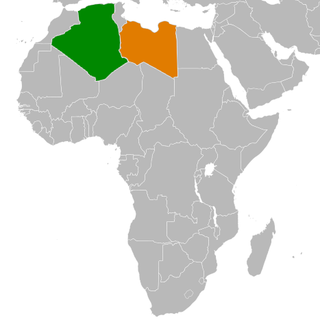Related Research Articles

Muammar Muhammad Abu Minyar al-Gaddafi was a Libyan revolutionary, politician and political theorist who ruled Libya from 1969 until his assassination by rebel forces in 2011. He first served as Revolutionary Chairman of the Libyan Arab Republic from 1969 to 1977 and then as the Brotherly Leader of the Great Socialist People's Libyan Arab Jamahiriya from 1977 to 2011. Initially ideologically committed to Arab nationalism and Arab socialism, Gaddafi later ruled according to his own Third International Theory.

Saif al-Islam Muammar al-Gaddafi is a Libyan political figure. He is the second son of the late Libyan leader Muammar Gaddafi and his second wife Safia Farkash. He was a part of his father's inner circle, performing public relations and diplomatic roles on his behalf. He publicly turned down his father's offer of the country's second highest post and held no official government position. According to United States Department of State officials in Tripoli, during his father's reign, he was the second most widely recognized person in Libya, being at times the de facto prime minister, and was mentioned as a possible successor, though he rejected this. An arrest warrant was issued for him on 27 June 2011 by the International Criminal Court (ICC) for charges of crimes against humanity against the Libyan people, for killing and persecuting civilians, under Articles 7(1)(a) and 7(1)(h) of the Rome statute. He denied the charges.

Muammar Gaddafi became the de facto leader of Libya on 1 September 1969 after leading a group of young Libyan Army officers against King Idris I in a bloodless coup d'état. After the king had fled the country, the Revolutionary Command Council (RCC) headed by Gaddafi abolished the monarchy and the old constitution and established the Libyan Arab Republic, with the motto "freedom, socialism and unity". The name of Libya was changed several times during Gaddafi's tenure as leader. From 1969 to 1977, the name was the Libyan Arab Republic. In 1977, the name was changed to Socialist People's Libyan Arab Jamahiriya. Jamahiriya was a term coined by Gaddafi, usually translated as "state of the masses". The country was renamed again in 1986 as the Great Socialist People's Libyan Arab Jamahiriya, after the United States bombing that year.

Abdul Ati al-Obeidi was a Libyan politician and diplomat. He held various top posts in Libya under Muammar Gaddafi; he was Prime Minister from 1977 to 1979 and General Secretary of General People's Congress from 1979 to 1981. He was one of three main negotiators in Libya's decision to denounce and drop their nuclear weapons program.

Abdessalam Jalloud is a Libyan former politician and military officer who served as the Prime Minister of Libya from 16 July 1972 to 2 March 1977, under the government of Muammar Gaddafi. He was also Minister of Treasury from 1970 until 1972.
The Revolutionary Guard Corps or Jamahiriyyah Guard was a Libyan paramilitary elite unit that played the role of key protection force of the regime of Muammar Gaddafi, until his death in October 2011. Composed of 3,000 men hand-picked from Gaddafi's tribal group in the Sirte region, the Guard was well armed, being provided with T-54 and T-62 tanks, APCs, MRLs, SA-8 SAMs and ZSU-23-4 anti-aircraft guns taken from the army inventory. As of 2005, its commander was Hasan al-Kabir al-Gaddafi, a cousin of the former Libyan leader.

The Revolutionary Command Council was the twelve-person governing body that ruled the Libyan Arab Republic after the 1969 Libyan coup d'état by the Free Officers Movement, which overthrew the Senussi monarchy of King Idris I. The council's chairman was Muammar Gaddafi, who had the most influence and served as Libya's de facto head of state as Revolutionary Chairman of the Libyan Arab Republic and commander-in-chief of the armed forces. It was ideologically Arab nationalist, republican, anti-imperialist and pan-Arabist.

Libya–Russia relations are the bilateral relations between the State of Libya and the Russian Federation. Russia has an embassy in Tripoli, with Libya having an embassy in Moscow. Diplomatic contact between Russia and Libya has generally been close and productive, seeing as both countries have had and continue to see volatile relations with the United States. Former Libyan leader Muammar al-Gaddafi was a close ally of the Soviet Union, despite his country's membership in the Non-Aligned Movement. Russia also regards Libya as one of its strongest allies in the Arab world, and has supported stabilization of the country following the aftermath of the Libyan Civil War. After the outbreak of new conflict, Russia has primarily backed the Tobruk-based House of Representatives over the UN-backed Government of National Accord and various other factions.

Relations between Algeria and Libya are considerably strained by tensions between the revolutionary National Transitional Council (NTC) of Libya and the single-party autocracy of President Abdelaziz Bouteflika of Algeria. Bilateral relations were generally amicable during Muammar Gaddafi's 42-year rule of Libya.

Moussa Muhammad El-Haj Nemr Koussa is a Libyan political figure and diplomat, who held several high-profile positions in the Libyan government, lastly as Minister of Foreign Affairs from March 2009, into the Libyan Civil War, when he resigned his position on 30 March 2011.
Mohamed Abu al-Qasim al-Zwai is a Libyan politician who was the last Secretary General of Libya's General People's Congress and thus the country's nominal head of state from 2010 until 2011. He replaced Imbarek Shamekh. He was reportedly a longtime personal friend of Muammar Gaddafi and credited with first introducing Gaddafi to Abdessalam Jalloud. As of 8 September 2011, he is in custody of the NTC forces.
Hannibal Muammar Gaddafi is the fifth son of former Libyan leader Muammar Gaddafi and his second wife, Safia Farkash.

The Libyan civil war or the 2011 Libyan revolution, also known as the First Libyan Civil War was an armed conflict in 2011 in the North African country of Libya that was fought between forces loyal to Colonel Muammar Gaddafi and rebel groups that were seeking to oust his government. The war was preceded by protests in Zawiya on 8 August 2009 and finally ignited by protests in Benghazi beginning on Tuesday, 15 February 2011, which led to clashes with security forces who fired on the crowd. The protests escalated into a rebellion that spread across the country, with the forces opposing Gaddafi establishing an interim governing body, the National Transitional Council.
Abdullah Senussi is a Libyan national who was the intelligence chief and brother-in-law of Colonel Muammar Gaddafi. He was married to Gaddafi's sister-in-law.

Field Marshal Khalifa Belqasim Omar Haftar is a Libyan politician, military officer, and the commander of the Tobruk-based Libyan National Army (LNA). On 2 March 2015, he was appointed commander of the armed forces loyal to the elected legislative body, the Libyan House of Representatives.
Mansour Dhao Ibrahim is a Libyan former politician. He was a prominent figure in the Gaddafi government, serving as Muammar Gaddafi's chief of security until they were both captured. Dhao was the leader of the regime's People's Guard. He is Gaddafi's cousin.

The killing of Muammar Gaddafi took place on 20 October 2011 after the Battle of Sirte. Muammar Gaddafi, the deposed leader of Libya, was captured by NTC forces and executed shortly afterwards.

Libyan nationalism refers to the nationalism of Libyans and Libyan culture. Libyan nationalism began to arise with the creation of the Senussi religious orders in the 1830s that blended North African Sufism with orthodox Islam. After colonization of Libya by Italy, opponents of Italian colonial rule from Tripolitania and Cyrenaica combined forces in 1922, with Senussi leader Omar Mukhtar leading the revolt against Italian forces in Libya. Libya became an independent state after World War II.

Ahmed Gaddaf al-Dam is the cousin and aide of former Libyan leader Muammar Gaddafi. He is Libya's former Special Envoy to Egypt and a leading figure of the Gaddafi regime. He was a key member of Gaddafi's inner circle.

Israel–Libya relations describes the relations between Israel and Libya. While there have been no formal diplomatic agreements between Israel and Libya since Libya's independence, there have been some notable events and developments in their relationship over the years. One of the main reasons for Libya's antagonism towards Israel has been its support for the Palestinian cause. Libya, under the rule of Muammar Gaddafi, was a staunch supporter of the Palestinian cause and provided aid and support to various Palestinian militant groups.
References
- ↑ Gershowitz, Suzanne (2005-04-15). "Same Old Kadafi". The Baltimore Sun . Archived from the original on 2009-04-18.
- ↑ Eljahmi, Mohamed (Winter 2006). "Libya and the U.S.: Qadhafi Unrepentant". Middle East Quarterly. 13 (1). Middle East Forum.
- ↑ "UK News".